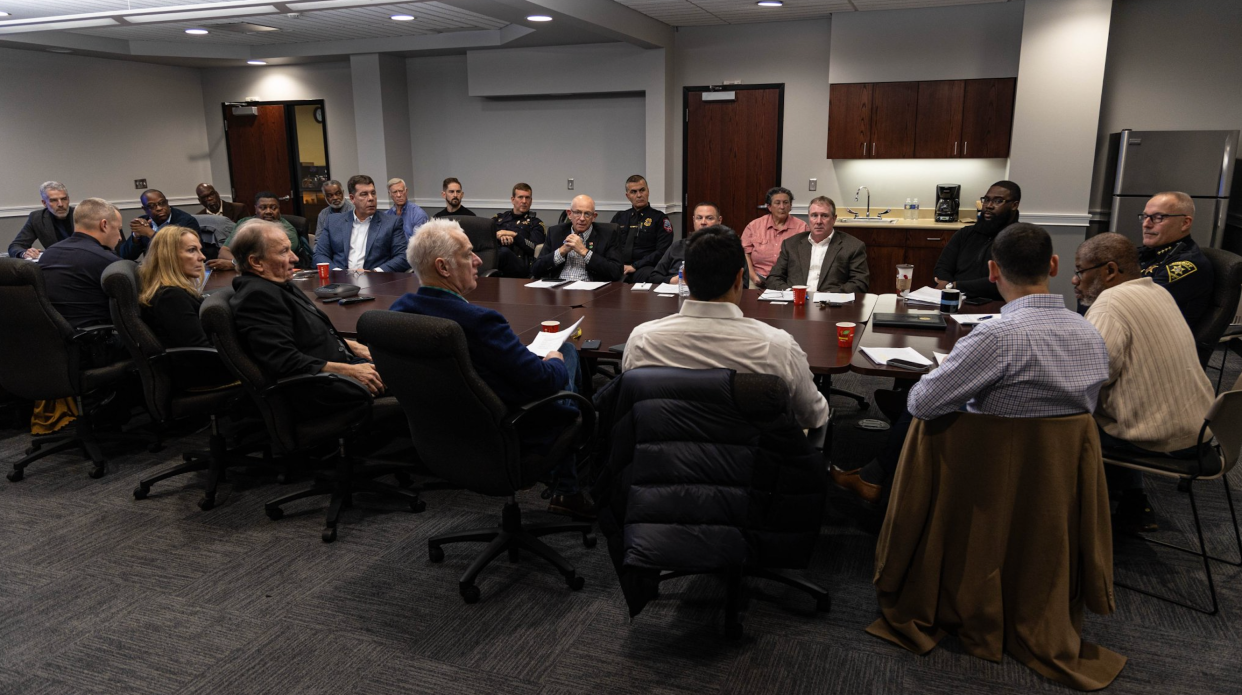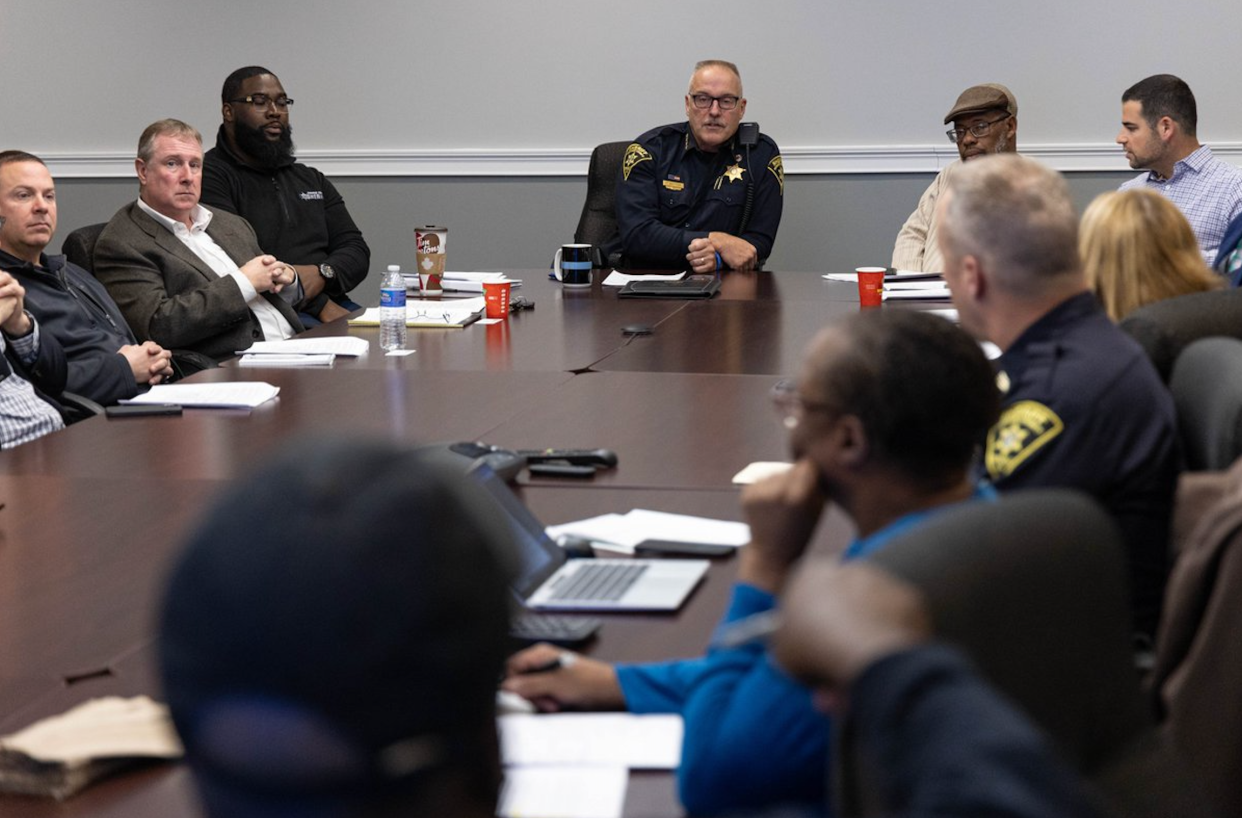In the spotlight: local law enforcement officers' fight for changes in the Bail Reform Act
In 2019, New York passed legislation curtailing cash bail for nonviolent defendants, hailed as a measure to stop the poor from being jailed before trial simply because they had few resources.
Since, backlash has risen among numerous district attorneys, judges, county legislators and law enforcement officials, who are sounding alarms and raising the specter of criminals on the loose.
The Consortium for Safe Communities (CSC) is a group consisting of victims, clergy, businesspeople, law enforcement, medical experts, legal professionals, community groups, and private citizens who all share the same goal: public safety.
The group began meeting in October 2022. Upon inception, its come to create four initiatives, amendments to the current bail reform legislation, including the introduction of a repeat offender standard and opposition to elder parole legislation.

On Thursday, the CSC Mohawk Valley Chapter gathered at Hart's Hill Inn in Whitesboro.
Guest speakers included: Oneida County Sheriff Rob Maicol, Monroe County Sheriff Todd Baxter, Oneida County Executive Anthony Picente Jr., and local resident Bridget Brezinski.
The goal? “To push for consortium expansion along the I-90 corridor so that downstate legislators finally start to listen,” said Baxter.
'An unsustainable situation'
Baxter, a 36-year veteran of law enforcement, spearheaded the program out of Rochester.
“Our state finds itself in an unsustainable and untenable situation,” underscored Baxter. “The unintended and violent consequences of well-intentioned but flawed criminal justice reforms have reached unprecedented levels."
As stated by Baxter, the consortium is not a solution, or proposal to turn back toward a flawed system, but rather a “way to gauge public opinion."
Maicol said he’s watched the program spread across Monroe, Erie, and Niagara counties.
Now, it's entered the Mohawk Valley.
“Over the years, Oneida County has seen a decline in public safety,” acknowledged Maicol. “Our current criminal justice system isn't able to protect repeat victims. We have to work together to change law enforcement in every village, town, city and county across this state. That’s why we support CSC.”
According to Baxter, the consortium began with the simple idea to sit down with local stakeholders to debate, listen, and learn. While it's grown and continues to, he noted there’s still work to do to get downstate legislators to tune into CSC's proposals.
“We’re failing at our jobs,” said Baxter. “And, we’re frustrated because we don’t have the tools to keep our communities safe. But what’s promising is that more and more people are joining the pro-public safety movement.”

CSC propositions
Maicol and Baxter emphasized that bail reform legislation is not a political issue, it’s a public safety one.
In a statement released by CSC, the group outlined its core initiatives:
1. Risk of Public Safety Standard. New York State is the only state in the nation that does not empower judges to detain individuals when they pose a threat to the community, and release them once the danger is mitigated. We ask that this be remedied.
2. Introduce a "Repeat Offender Standard" to ensure public safety by immediately detaining individuals re-arrested while out on appearance tickets or their own recognizance; subject to judicial review within 144 hours (160 on weekends). This status would apply to A-misdemeanors and above, without differentiation between qualifying and non-qualifying offenses.
3. Review and draft "Clean Law" to uphold the positive intentions of bail reform while safeguarding constituents from individuals who persist in criminal activities. The law should be easily understood by the entire community and those directly involved, including judges, law enforcement officers, prosecutors, defense attorneys, victims, and defendants.
4. Opposition for Elder Parole Legislation – currently in committees in both houses, this legislation would provide for convicted criminals to be considered for parole, regardless of the sentence handed down by a judge based upon their age. This concept is dangerous, arbitrary, and re-victimizes.
Protecting repeat victims
In Monroe County Jail alone, there are 47 individuals held on federal gun charges.
“We’ve resorted to federal law to circumvent the state law,” Baxter said. “Otherwise, we’d be forced to release criminals back into our streets. We’re forgetting about the V’s on these reports; the victims. It’s not just about repeat offenders; it's very much so about repeat victims.”
Brezinski recounted her own experiences. Although emotional, she said, it’s important to be a voice for those unable to use their own.
She said her abuser was arrested, but released from jail on their own recognizance the next morning, which led to months of “aggressive stalking,” another physical attack, and yet another early release.
“The stalking ended when the violence escalated to a point where the state could no longer ignore it,” claimed Brezinski, who said her abuser was finally sentenced to six months in jail.
Brezinski praised YMCA Rapid Housing for helping her reiterate her life during that period in her life.

Call to action
Brezinski’s story is not uncommon.
The 2022 Division of Criminal Justice Services Domestic Violence Victim report recorded 1,636 incidents in Oneida County; roughly four cases each day.
“How many people don’t call because they feel hopeless their perpetrator will be held accountable?” Brezinksi asked. “We must ensure our victims become survivors.”
The call to action left the room speechless.
“If you aren’t moved by Bridget’s story I don’t know what else to tell you,” said Picente. “We are taught from a young age that there are consequences for our actions. The bottom line is crime should yield repercussions.”
Picente agreed that keeping the CSC momentum rolling takes all hands on deck.“We have a community to protect and a system that can’t sustain itself,” continued Picente. “It’s time for a change.”
This article originally appeared on Observer-Dispatch: Local law enforcement officers push for Bail Reform Act amendments
